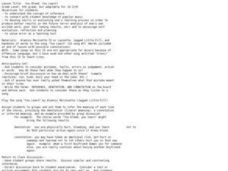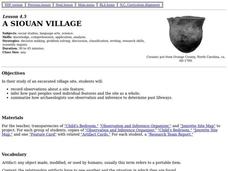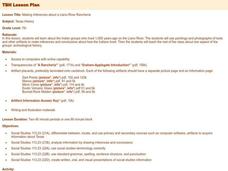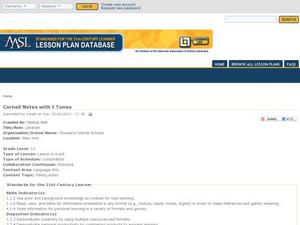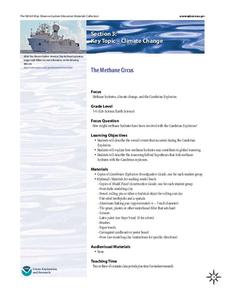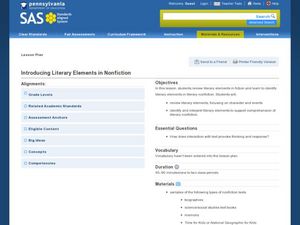Curated OER
Teaching Inference with Trash and Mystery Objects
Students practice solving mysteries and using inference skills by digging through trash. In this problem solving lesson, students investigate groups of garbage to determine what type of person the garbage belonged to....
Curated OER
You Bleed, You Learn?
Jump back into the 90s with Alannis Morissette's song "You Learn." After hearing the song, small groups analyze the lyrics and write an essay about a mistake they've learned from. Use the example sentences to identify the denotative and...
Curated OER
Stone Soup
First graders examine the use of logic, deduction, and inference to determine the answers to riddles. They listen to a teacher read aloud of Heather Forest's, Stone Soup before discussing the story which gauges their comprehension....
NOAA
Animals of the Fire Ice
When the sun's rays can't reach the producers in a food web, where does all the energy come from? Extreme environments call for extreme food sources. Young scientists investigate creatures that appear to get their energy from methane...
NOAA
Journey to the Unknown
What's it like to be a deep-sea explorer? Tap into the imaginations of your fifth and sixth graders with a vivid instructional activity, the second part of a six-part adventure. Learners close their eyes and submerge themselves in an...
Curated OER
During Reading Strategies (Inferring)
Students practice their reading skills. In this reading fluency and comprehension lesson, students read instructor-selected passages and use metacognitive skills to make inferences based on the selections.
Pocumtuck Valley Memorial Association
A Research Project: A Discussion of the Recreating and Populating of a Colonial Village
Primary source research, secondary source readings, and discussion provide the understanding necessary for students to create a colonial persona, and simulate a situation appropriate for this person, time, and place. While the lesson...
EngageNY
Reading and Taking Notes on Colonial Trades
In the tenth instructional activity of this unit, young scholars learn to categorize information as they continue researching their colonial trade. During guided practice, the teacher models how to read informational text slowly while...
EngageNY
Listening Closely and Taking Notes: Colonial Trade Podcast About the Wheelwright
Voices from the past. Young scholars listen to a podcast interview with a historical re-enactor as they continue their research in the eleventh instructional activity of this unit on colonial trade. Applying their close reading skills,...
Curated OER
Kumeyaay Indians
Useful for literary analysis, citing textual evidence, or summary skills, this activity about the Kumeyaay Indians would be a good addition to your language arts class. Middle schoolers read novels and summarize the literature in their...
Curated OER
Apply Post-Reading Skills and Discuss Persuasive Text
Students put their reading comprehension skills to practice. In this interpreting text lesson, students read "Chief Red Jacket's Reply," and then respond to questions that require them to reason, infer, and analyze the selection.
Curated OER
Amazon Adventure: a Case Study in Medical Technology And Bioethics
Students test problem-solving skills, the ability to see connections, and the ability to draw conclusions and inferences from information provided in a case study. Given a case study, they formulate a procedure and draw conclusions.
Curated OER
A Siouan Village
Fourth graders examine the artifacts obtained from an excavated Siouan village site. They make inferences about the people who once lived there based on the artifacts and complete a Research Team Report.
NOAA
History's Thermometers
How is sea coral like a thermometer? Part three of a six-part series from NOAA describes how oceanographers can use coral growth to estimate water temperature over time. Life science pupils manipulate data to determine the age of corals...
Museum of Tolerance
Developing Media Literacy
To protect young people from questionable content, many schools limit access. This resource suggests that because learners can so readily avail themselves to unrestricted Internet access, it is vital for 21st century...
College Board
Evaluating Sources: How Credible Are They?
How can learners evaluate research sources for authority, accuracy, and credibility? By completing readings, discussions, and graphic organizers, scholars learn how to properly evaluate sources to find credible information. Additionally,...
Curated OER
Making Inferences about a Llano River Rancheria
Seventh graders study the Indian groups who lived 1,000 years ago on the Llano River. They use paintings and photographs of tools and other artifacts to make inferences and conclusions about how the Indians lived.
Curated OER
Sophocles' Oedipus the King
Introduce your class to the Greek tragedy with a study of Sophocles’ Oedipus the King. Learners examine the features of a Greek tragedy, Sophocles’ achievements and contributions, and the universal themes that make the drama an...
Reed Novel Studies
The Mostly True Adventures of Homer P. Figg: Novel Study
What was the purpose of the Enrollment Act of 1863? Pupils consider the topic while completing the novel study for The Mostly True Adventures of Homer P. Figg by Rodman Philbrick. They write original similes and answer reading...
Curated OER
Cornell Notes with I Tunes
Note taking is an invaluable skill and requires practice. This instructional activity incorporates the Cornell Notes format, however the plan itself could be implemented to teach any style. The basic idea here is to use university...
NOAA
The Methane Circus
Step right up! An engaging research-centered lesson, the third in a series of six, has young archaeologists study the amazing animals of the Cambrian explosion. Working in groups, they profile a breathtaking and odd creature and learn...
Curated OER
Reading About the Journey: The Odyssey
Students practice their reading skills. In this reading fluency and comprehension instructional activity, students read instructor-selected passages from The Odyssey following the provided steps for the reading class activity that...
Curated OER
Introducing Literacy Elements in Nonfiction
Explore nonfiction writing with your class. They will identify elements in nonfiction by reviewing elements of fiction. Then they use biographies, memoirs, menus, Time for Kids, and text books to identify elements of nonfiction. They...
California Academy of Science
Human Evolution
As the great and hilarious Tim Minchin once said, "Science is simply the word we use to describe a method of organizing our curiosity." Science is more than just a guess; it is based on questions, observations, and evidence. High...
Other popular searches
- Teaching Inference Skills
- Inference Skills First Grade
- Reading Inference Skills
- Powerpoint Inference Skills
- Inference Skills in Reading
- Inference Skills Worksheet
- Science Inference Skills
- Inference Skills Sixth Grade

